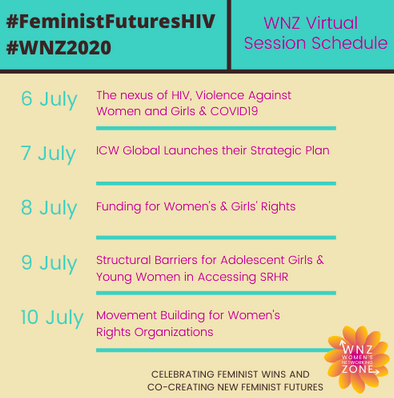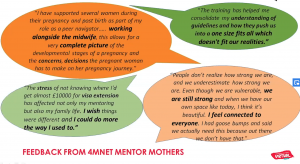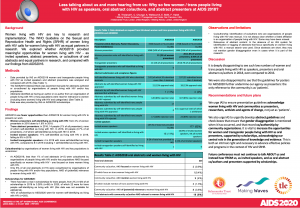Salamander Trust at AIDS2020
Salamander Trust is happy to be taking part in the 23rd international AIDS Conference…..
 This is the first international AIDS Conference to take place virtually
This is the first international AIDS Conference to take place virtually
We are delighted to be taking part with our partners, 4M Mentor Mothers Network CIC, and Making Waves
To see a list of our activities in the main conference, please click here or scroll down
…. as well as in The Women’s Networking Zone in the Global Village
 The 2020 WNZ is co-convened by ATHENA Network, with CHANGE, Frontline Aids, Girls and Women Empowerment Network, Girls Not Brides, ICW North America, Making Waves, Positive Young Women Voices, Salamander Trust, Womandla, Youth Arise and Young Women Empowerment Network
The 2020 WNZ is co-convened by ATHENA Network, with CHANGE, Frontline Aids, Girls and Women Empowerment Network, Girls Not Brides, ICW North America, Making Waves, Positive Young Women Voices, Salamander Trust, Womandla, Youth Arise and Young Women Empowerment Network
To read about the Women’s Networking Zone and its ‘herstory’, click here.
To read our Beijing+ 25 statement, click here.
6 July: Opening session and VAWG panel: to watch the recording, click here
7 July: ICW Global launches its Strategic Plan: to watch the recording, click here
8 July: Session on funding* for women’s & girls’ rights: to watch the recording, click here; and to watch the twitter moment, click here
9 July: Structural barriers for adolescent girls & young women: to watch the recording, click here.
10 July: Movement Building for Women’s Rights Organisations: details here
To see ATHENA’s summary of the whole WNZ 2020 week, click here
* to read our blog about the funding issues, click here.
Main Conference:
Monday 6 July | 10.am UK time (BST) | SS24 | Symposia & Bridging Session | Differentiated service delivery: One size does not fit all
4M Mentor Mothers Network CIC Co-Director Longret Kwardem took part in the Q&A session for this symposium
 Longret’s presentation is called: Civil society perspective on differentiated service delivery for women living with HIV: A case study of 4M Mentor Mothers Network CIC (UK)
Longret’s presentation is called: Civil society perspective on differentiated service delivery for women living with HIV: A case study of 4M Mentor Mothers Network CIC (UK)
To view and hear Longret’s presentation on our vimeo channel, click here. To access it on the AIDS2020 platform, click here.
E-Poster, Track F | PEF1894 | Less talking about us and more hearing from us: Why so few women / trans people living with HIV as speakers, oral abstract co/authors, and abstract presenters at AIDS 2018?
 Martha Tholanah speaks to this research which documents the on-going lack of meaningful involvement of women living with HIV in the AIDS conferences. This poster is co-authored by Cecilia Chung, Martha Tholanah, Emma Bell, Fiona Hale and Alice Welbourn. To access the poster, and hear Martha describe our research, click here.
Martha Tholanah speaks to this research which documents the on-going lack of meaningful involvement of women living with HIV in the AIDS conferences. This poster is co-authored by Cecilia Chung, Martha Tholanah, Emma Bell, Fiona Hale and Alice Welbourn. To access the poster, and hear Martha describe our research, click here.
Background information:
To read more about the issues being discussed, follow the links below.
eSRHR: 4M Mentor Mothers Network advocates to ensure the SRHR of all women living with HIV across the perinatal journey. For too long, the emphasis has been on “eMTCT”. In its new Advocacy Brief, just launched, 4M describes its work and explains why. In a separate workstream, our podcast paper on SRHR explains why this is such an important issue across our lifespans. To read all our work with partners around the development of the WHO 2017 Guideline on the SRHR of women living with HIV, its implementation guide and case study annex, click here.
Peer research: We have always called for the meaningful involvement of women living with HIV in all decisions that affect our lives. Another recent podcast paper explains why. Our UNAIDS-commissioned ALIV[H]E framework explains how. And our recent BMJ SRH Journal blog asks when researchers and their journals will follow the WHO Guideline on this.
Violence against women and girls: Intimate Partner Violence against women and girls increases their vulnerability to acquiring HIV by a factor of 1.5. Violence against women and girls also increases, both at home and in healthcare settings, on diagnosis, which also causes, or exacerbates mental health problems. Women living with HIV who are already marginalised by society in other ways experience even more violence and mental health problems. Not only are these experiences a violation of their rights. These challenges can also affect the ability to start, take or adhere to ARVs and other medication. The key role that violence can play is often overlooked or unnoticed, both in HIV prevention and in HIV-treatment policies and programming, in part because women often find it so hard to talk about. To read an article about our review with partners, commissioned by UNWomen, which explains this, click here. To read our UNAIDS-commissioned ALIV[H]E Framework, with partners, to address violence against women in the context of HIV in communities, click here. To read a related article and a booklet of case-studies about its use, click here.
Funding: There is a chronic lack of funding of women’s rights organisations globally. A third of our podcast papers describes the hugely challenging experiences of many of our podcast contributors. This blog by our colleagues at Making Waves describes more.
Adolescent girls and young women: our work on our Stepping Stones flagship training programmes with many partners has taught us a lot about how best to work ethically, effectively and sustainably with adolescent girls and young women. To view a plenary presentation about this, made by Ellen Bajenja at the 3rd International Workshop on Adolescence in Nairobi in late 2019, click here.
Movement building: For any effective gendered and rights-base social norms change, whether to prevent HIV, or to uphold the SRHR of women living with HIV, it is essential to have a vibrant independent women’s rights movement. To read a recent blog with our colleagues at CUSP about this, on the ALIGN Platform, in light of the recently finished DfID-funded What Works to Prevent Violence against Women evaluation, click here.
